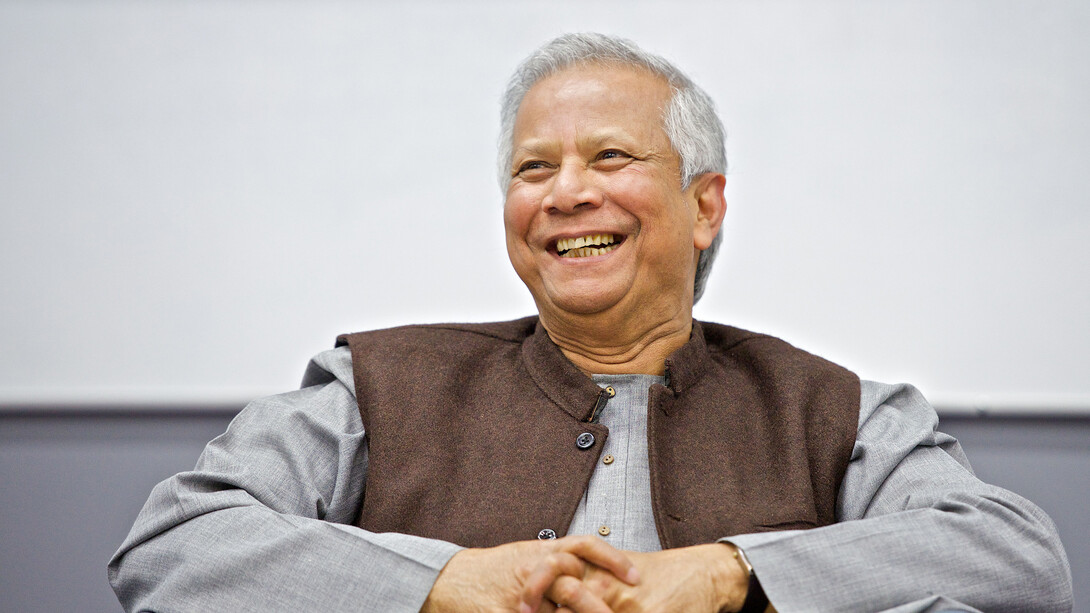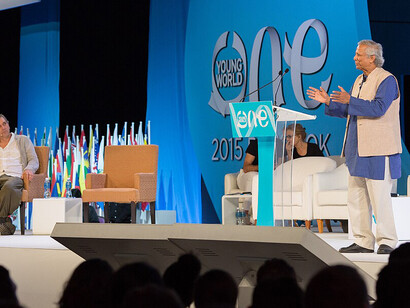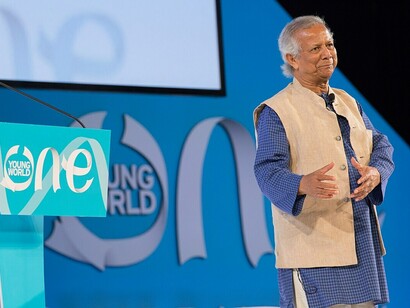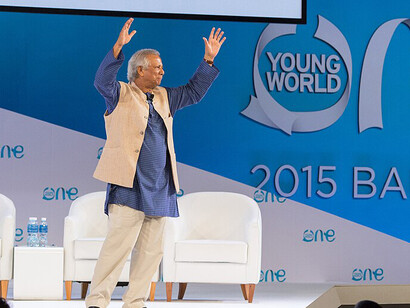Dr. Muhammad Yunus is a name synonymous with innovation, social entrepreneurship, and economic empowerment. A Nobel Laureate, economist, and social reformer, he has transformed millions of lives through his groundbreaking concept of microfinance. His work has positioned Bangladesh as a global leader in financial inclusion and poverty alleviation. In addition to his contributions in microfinance, Dr. Yunus has recently taken on a new role as the interim head of the government of Bangladesh, leading the country through a critical transition period. This article explores the life, achievements, and lasting impact of Dr. Muhammad Yunus, the pride of Bangladesh.
Early life and education
Born on June 28, 1940, in the port city of Chittagong, Bangladesh, Muhammad Yunus showed early promise in academics. He completed his primary and secondary education in Chittagong before earning a Fulbright scholarship to study in the United States. He pursued higher education at Vanderbilt University, where he obtained a Ph.D. in economics. Upon returning to Bangladesh, he became a professor at Chittagong University, where his journey toward social entrepreneurship began.
The birth of microfinance and Grameen Bank
Dr. Yunus’s most significant contribution to society came in the 1970s when he developed the concept of microcredit. The idea emerged during the devastating famine of 1974 when Yunus observed that a lack of small financial resources prevented people from escaping poverty. He discovered that even a tiny loan of a few dollars could empower poor entrepreneurs, particularly women, to start small businesses and generate income.
In 1976, he provided small loans to a group of impoverished women in the village of Jobra, proving that the poor are creditworthy. This experiment laid the foundation for the Grameen Bank, formally established in 1983. The bank’s model, based on collateral-free lending, aimed to support marginalized communities by offering them access to credit without the bureaucratic hurdles of traditional banking systems. Over the years, Grameen Bank’s impact expanded globally, inspiring similar microfinance initiatives worldwide.
Nobel prize and global recognition
Dr. Yunus’s work in microfinance earned him widespread international acclaim. In 2006, he was awarded the Nobel Peace Prize jointly with the Grameen Bank for their efforts to create economic and social development from below. The Nobel Committee acknowledged that microcredit had become an important instrument in combating poverty and empowering women.
Beyond the Nobel Prize, Dr. Yunus has received numerous prestigious accolades, including the Presidential Medal of Freedom from the United States, the Congressional Gold Medal, and the King Hussein Humanitarian Leadership Award. His influence extends beyond Bangladesh, as he has served as an advisor to global institutions, shaping policies on poverty alleviation and social business.
Social business and entrepreneurship
Apart from microfinance, Dr. Yunus pioneered the concept of social business, which aims to solve societal problems through financially sustainable enterprises. Unlike traditional businesses, social businesses focus on addressing social issues rather than maximizing profits for shareholders.
One of his most notable ventures is the Grameen Danone initiative, a partnership with French multinational Danone, which produces affordable, nutrient-rich yogurt to combat malnutrition among children in Bangladesh. Other ventures include Grameen Veolia (providing clean water) and Grameen Shakti (promoting renewable energy).
Role as the interim government head of Bangladesh
In a significant political development, Dr. Muhammad Yunus has been appointed as the interim head of the government of Bangladesh. His leadership comes at a time of political and economic challenges, and his appointment reflects the trust in his integrity, vision, and commitment to the welfare of the people. As interim leader, he is expected to bring his expertise in economic reform, social justice, and financial inclusion to address key national issues, including governance, economic stability, and international relations.
His leadership is anticipated to focus on fostering unity, ensuring transparent governance, and promoting sustainable economic policies. Given his background in social entrepreneurship, he may introduce new initiatives to support marginalized communities, enhance employment opportunities, and strengthen Bangladesh’s global economic position.
Impact on Bangladesh’s economy and society
Dr. Yunus’s contributions have significantly influenced Bangladesh’s socioeconomic landscape. His efforts in microfinance have lifted millions out of poverty, particularly women, who form the majority of Grameen Bank’s borrowers. By providing financial independence, he has empowered women to become decision-makers in their families and communities.
His vision has also played a crucial role in fostering entrepreneurship in Bangladesh. Many small-scale entrepreneurs, from rural artisans to urban start-ups, have benefited from his initiatives, creating employment opportunities and driving economic growth. Furthermore, his advocacy for financial inclusion has encouraged other financial institutions to adopt similar models, promoting sustainable development nationwide.
As the interim head of the government, Dr. Yunus’s leadership is expected to further bolster Bangladesh’s economic growth by promoting inclusive policies, fostering diplomatic ties, and ensuring stability during this transitional period.
Challenges and controversies
Despite his achievements, Dr. Yunus has faced challenges and controversies. In 2011, he was removed from his position as managing director of Grameen Bank due to a government-imposed age limit, which many believed was politically motivated. His relationships with Bangladeshi political leaders have been complicated, with some viewing his growing influence as a threat.
Additionally, criticisms of microfinance models have emerged, including concerns about high-interest rates and debt cycles among borrowers. However, Dr. Yunus has continuously defended the ethical approach of Grameen Bank, emphasizing its mission to uplift the poor rather than exploit them.
As the interim head of the government, he may face political resistance from various factions. However, his reputation as a visionary leader and economic reformer provides hope that he can navigate these challenges effectively and steer Bangladesh toward a prosperous future.
Legacy and future prospects
Dr. Muhammad Yunus’s legacy extends beyond microfinance. His philosophy of social business continues to inspire young entrepreneurs and policymakers worldwide. His books, including Banker to the Poor and Creating a World Without Poverty, serve as essential guides for those interested in economic development and social entrepreneurship.
Despite political challenges, his influence remains strong, and his work continues to evolve. He has been a vocal advocate for addressing global issues such as climate change, unemployment, and the economic empowerment of youth. Through initiatives like the Yunus Centre, he promotes social business as a means to tackle pressing global challenges.
As interim government head, his leadership will be a defining chapter in Bangladesh’s history. If successful, his tenure could lay the foundation for a more transparent, inclusive, and progressive Bangladesh.
Dr. Muhammad Yunus is undoubtedly the pride of Bangladesh. His revolutionary contributions to microfinance, social business, and poverty alleviation have not only transformed his home country but also set a precedent for the world. His vision of an inclusive economy, where financial opportunities are available to all, continues to inspire change-makers globally. Now, as the interim head of the government, he has a new platform to drive meaningful change. As Bangladesh progresses towards becoming a developed nation, Dr. Yunus’s legacy serves as a guiding light, proving that with innovation and compassion, economic empowerment for all is achievable.















